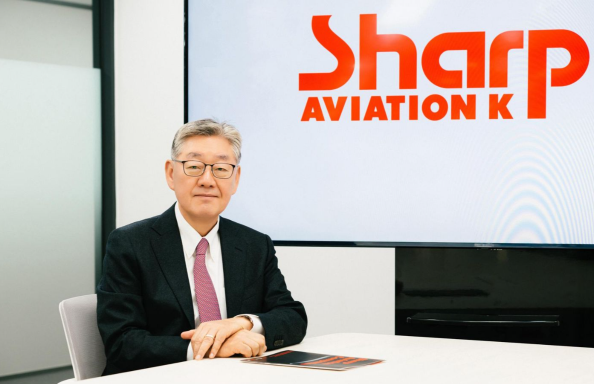 Download
Download
Sharp Aviation K positions itself as reliable
one-stop aviation service partner

By Lee Min-hyung, The Korea Times - Aviation service firm to open 2 hangars for MRO expansion
Sharp Aviation
K, the nation’s largest independent aviation service firm, will solidify its
identity as the most reliable one-stop aviation service partner to its global
clients, its CEO Paik Soon-suk said during a recent interview.
The company
has stable revenue structures in its aviation service business available at
eight airports across the nation.
After Korean
Air completed its legal filings to acquire Asiana Airlines in December 2024,
Sharp Aviation K has risen to become the nation’s second-largest airport ground
handling service provider.
The company,
however, maintains a leading position as an “independent” firm dedicated to
offering its services without any management link with other airlines.
“For the past
six decades, we have tried to build a strong stepping stone to offer stable and
diverse aviation services, including not just ground handling, but also
aircraft maintenance, repair and overhaul (MRO) to local low-cost carriers
(LCCs) and overseas airlines,” Paik told The Korea Times during an interview at
its headquarters in Seoul on Oct. 20.
According to
the head of the company, now is the time for Sharp Aviation K to cement its
corporate image as a one-stop aviation service provider, as no other players in
the industry here can offer such services reliably to foreign airlines.
“Our business
has jumped into a solid track for growth buoyed by strong partnerships with
dozens of global carriers,” Paik said. “We have focused on building
infrastructure for services for the past decade, and now we are in the phase of
winning trust from global carriers.”
For now, a
total of 55 overseas airlines — including American Airlines, Delta Air Lines,
Air India and Finnair — use services by Sharp Aviation K. Domestic partners
include T’way Air, Eastar Jet and Parata Air.
MRO growth
potential
The head of
Sharp Aviation K has found Korea’s strong growth potential in aircraft MRO, as
the economy has a balanced structure in both imports and exports.
This increases
demand for both inbound and outbound cargo aircraft. The country’s MRO
infrastructure, however, has remained too weak to cover solid demand for the
service from overseas airlines, according to Paik.
“We identified
the MRO business as one of our next major revenue areas that can generate
synergy with our existing aviation services,” he said.
Sharp Aviation
K has an MRO affiliate — Sharp Technics K — and is making large investments to
expand the firm’s maintenance capability.
“By the end of
2027, we will be able to offer MRO services for 20 aircraft at one time,” he
said.
The company
plans to open a major hangar by the end of this year, and another around the
end of 2026. This will enable the firm to operate a total of three hangars for
aircraft MRO services. According to Sharp Aviation K, the two new hangars will
generate annual sales of 50 billion won ($34.8 million) combined.
The hangars
will set Sharp Aviation K apart from most other firms in the sector. Korean Air
has its own hangars across the nation, but the airline focuses on handling
maintenance and repair for its own aircrafts, rather than doing so for other
carriers.
The
second-generation heir of Sharp Aviation K also cited its partnership with
Pratt & Whitney as proof of its growing MRO capability. The company is one
of the world’s largest aircraft engine makers with a history of more than 100
years.
“We offer
heavy maintenance services for the company’s test aircrafts,” Paik said. “Sharp
Technics K handles maintenance and repair services for Pratt & Whitney once
every two years. A growing number of renowned global carriers also contact us
to receive our MRO services.”
Demand for the
service is highly likely to increase down the road amid the rapid growth of
e-commerce, he said.
“Aviation
services will become more and more important in an era of e-commerce,” he said.
“We, as an independent aviation service provider, will continue expanding our
quality of service to win more orders from global clients.”
Even as the
company is on track for rapid earnings growth, Paik said most of the revenue
will be reinvested to expand its MRO infrastructure.
“It costs 200
billion won for us to build a hangar, and some 60 billion won for a cargo
terminal,” he said. “We do not have any immediate plans to become a more
profitable firm without investment. Sharp Aviation K prefers to achieve
sustainable growth by becoming more globally recognized as a reliable one-stop
aviation service provider.”